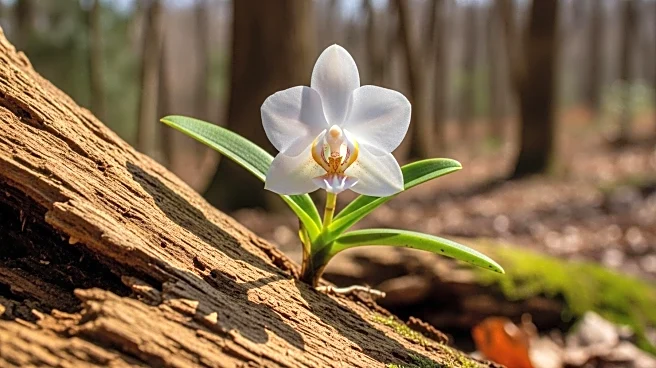What is the story about?
What's Happening?
Researchers at Kobe University have uncovered a significant ecological relationship between orchids and wood-decaying fungi. The study reveals that orchid seeds, which are extremely small and lack nutrients, rely on fungi associated with decaying wood for germination. This discovery fills a gap in understanding the ecology of wild orchids, highlighting the role of deadwood in providing essential carbon to germinating orchids. The research team, led by plant evolutionary ecologist Kenji Suetsugu, observed that orchid seedlings and adult plants with juvenile root structures were consistently found near decaying logs, suggesting a crucial partnership with wood-decaying fungi. The study, published in Functional Ecology, demonstrates that these fungi are vital for the early stages of orchid growth, with seedlings showing exclusive associations with fungi found on decaying wood.
Why It's Important?
This discovery has significant implications for both conservation efforts and ecological science. By identifying the dependency of orchids on wood-decaying fungi, the research underscores the importance of preserving deadwood in forest ecosystems. Deadwood serves as a major carbon source, facilitating the growth of orchids and potentially other plant species. The findings suggest that conservation strategies should include protecting deadwood and its associated fungi to support orchid populations. Additionally, the study reveals a hidden carbon pathway from deadwood to green plants, offering insights into how seedlings can thrive in shaded forest environments. This research contributes to a broader understanding of forest ecology and the complex interactions between plants and fungi.
What's Next?
The study opens avenues for further research into the ecological roles of wood-decaying fungi and their potential impact on other plant species. Conservationists may need to reassess strategies to include the protection of deadwood as a critical component of forest management. Future studies could explore the extent to which other plant species rely on similar fungal partnerships for germination and growth. Additionally, the findings may prompt investigations into the evolutionary pathways of orchids and their transition to full mycoheterotrophy, where they rely entirely on fungi for nutrition.
Beyond the Headlines
The research highlights the intricate and often overlooked relationships within ecosystems, emphasizing the importance of fungi in plant development. It challenges traditional views of deadwood as merely decomposing matter, instead presenting it as a vital component of forest life cycles. The study also raises questions about the potential for similar symbiotic relationships in other ecosystems, suggesting broader implications for biodiversity and ecosystem resilience.















